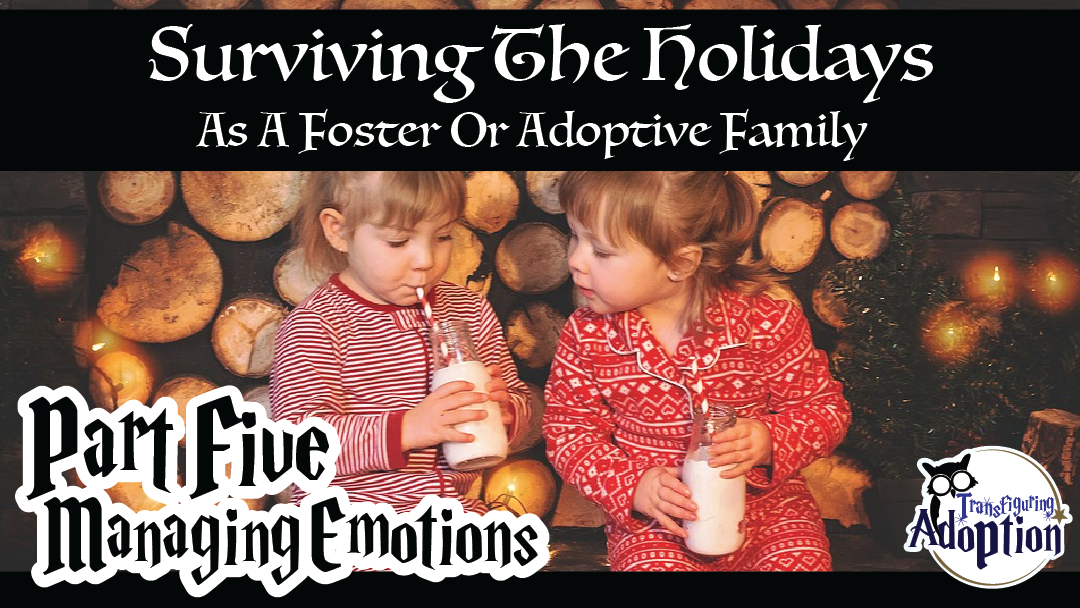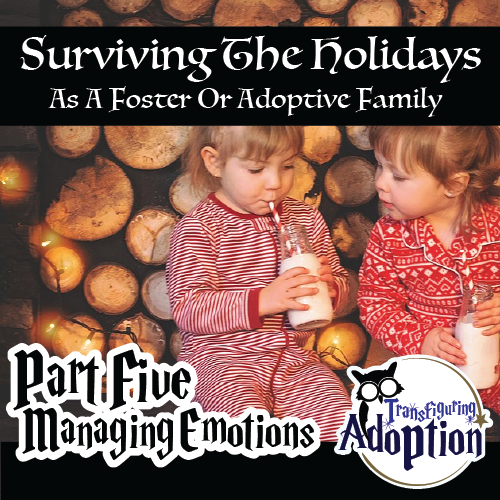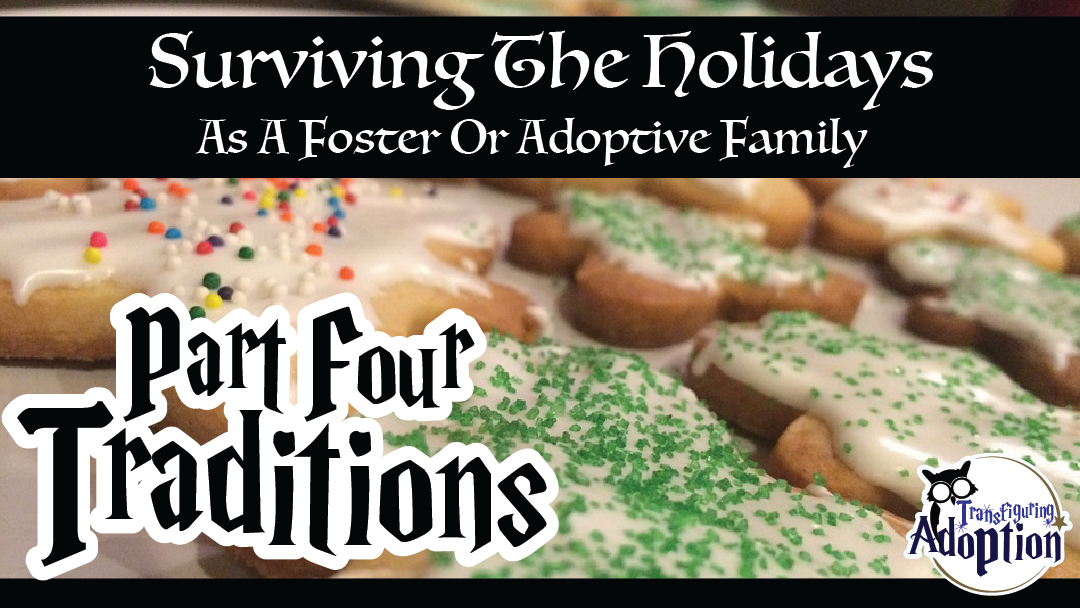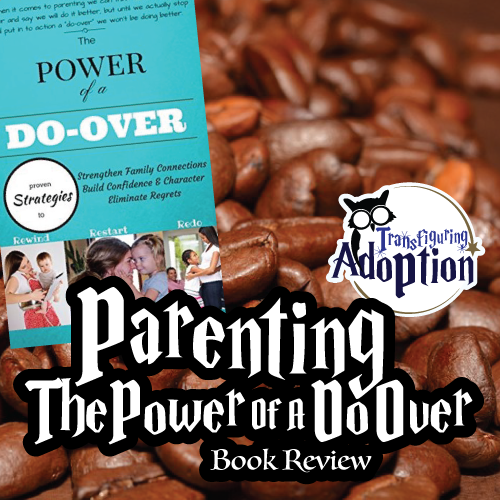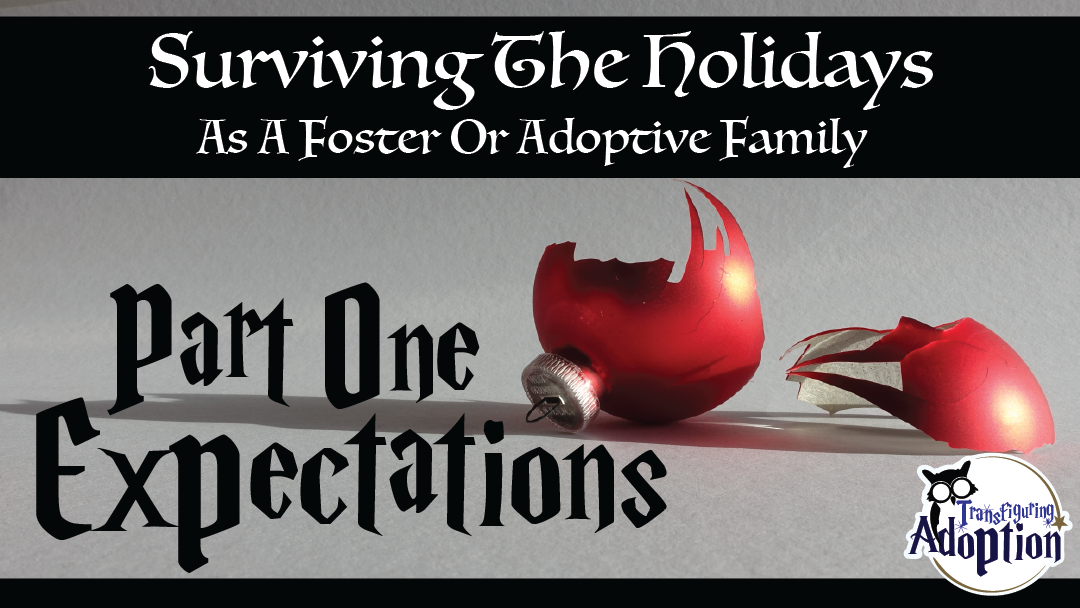This is Part 5 and the final installment of this series on surviving holidays as a foster or adoptive family. This is where we bring it all together with FIVE tips.
5 Tips for Managing Emotions During The Holidays
- Keep things low key.
So many foster and adoptive children, whether they have come to your home as older children or straight from the hospital, have had changes to their brain chemistry and functioning resulting in sensory processing issues. This means their brains don’t react the same way to sensations (stimuli) as a “typical” brain would. Certain sounds, lights, touches, smells, movements, and so on causes a reaction that can be extreme and easily misunderstood by others. By keeping celebrations smaller and more low key, we can help to minimize behaviors that result - Pay attention to trauma triggers.
I was molested once as a child, and on that day, one of the main visual memories I remember is a dark living room with a shadow of the Christmas tree on the wall. As a child, this was very triggering for me in the future when I saw a Christmas tree shadow. I had not disclosed the abuse, so my parents didn’t know and probably never noticed.
Likewise, with children from hard places, we may not always know, nor will they, what might trigger trauma memories for them. However, we can be detectives and really try to notice what comes before any major behaviors. Keep a journal for this so you can recognize patterns. Also, just be cognizant of movies or songs that may be triggering of tough emotions and try to steer clear. - Grieve as needed.
It’s important not just to give your child the needed time or space to grieve, but yourself as well. You may need to take some alone time after the kids are in bed prior to big days and just evaluate and acknowledge your own losses over what you pictured special days would be like as a foster or adoptive family. This can help you keep your emotions in check. - Practice needed skills with kids.
Before big days, you can practice and role play with children to help them prepare and prevent behavioral meltdowns. On a special needs parent group on Facebook, a mom recently talked about how for the month leading up to Christmas she has been wrapping up one of her child’s toys each day for the child to unwrap, giving the child practice so he wouldn’t be overwhelmed on the big day. How genius! I thought about the tradition some families have created of having a wrapped holiday book for each of the days of December leading up to Christmas to unwrap and read as a family. This would be a way to practice the skill, incorporate a new tradition, and have some bonding story time. You can practice dinner table skills, social graces… whatever skills you think your child may need to work on to experience greater success during the big day. - Work on regulation with everyone.
The biggest part of managing emotions is recognizing them and self-regulating. This is a process that most children learn to do as infants as toddlers as they learn to self-soothe and develop healthy coping mechanisms. Foster and adopted children have most often not properly developed these skills. When they (or we!) become dysregulated, behaviors and meltdowns start and begin a chain reaction in everyone around. Teach everyone in the family about self-regulation and present them tools for how to self-regulate, and show them how to seek help regulating themselves if they need it. This link will provide you with tools: Self Regulation Strategies.
I hope this series has been helpful to you. It is my desire that we as foster and adoptive families don’t just survive the holidays, but that we THRIVE and EXCEL. Wishing you and yours a healing holiday season.
Questions for Thought:
- How do you need to adapt your celebrations to make them more low key for your children?
- What behavioral triggers have you noticed in your child that you need to be careful to avoid?
- What feelings of loss or grief do you have related to holidays or special days?
- What skills may your children need for holiday success, and how can you practice or role play them beforehand?
- How can you work to regulate your own emotions?
If you missed Part 1 Through 4:
[Part 1: Expectations]
[Part 2: Honoring Feelings]
[Part 3: Balancing Relationships]
[Part 4: Tradition]
Now It’s Your Turn:
What methods have you found or developed for managing emotions in your household? Do you have any suggestions for other families? Be sure to share your thoughts below. Your answers will help other kids and parents too.
